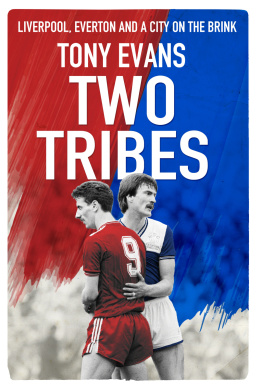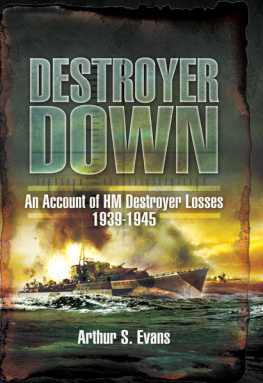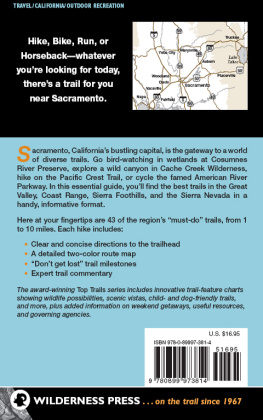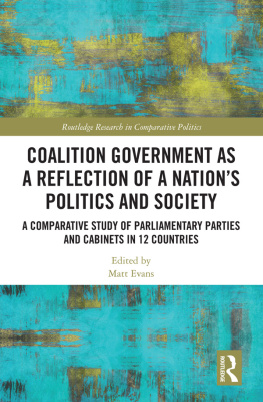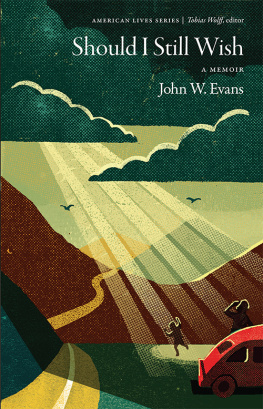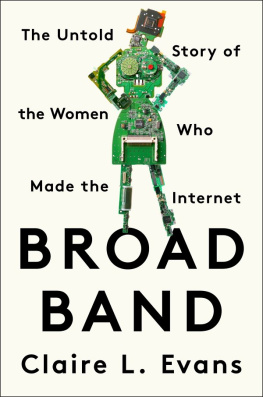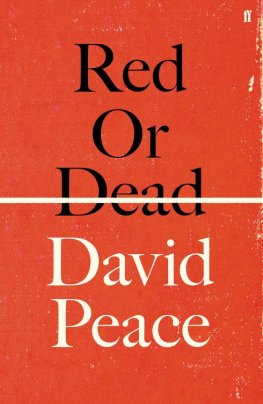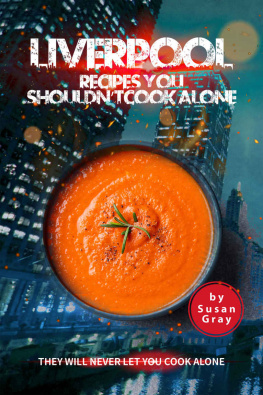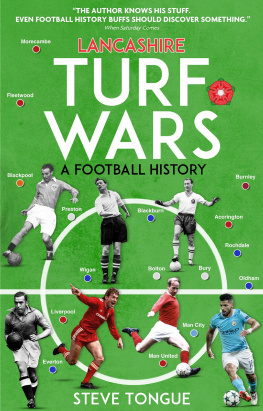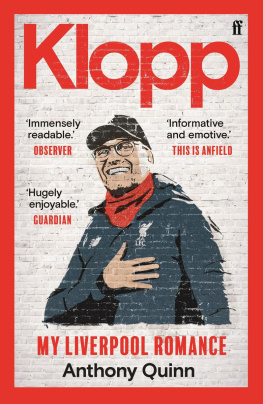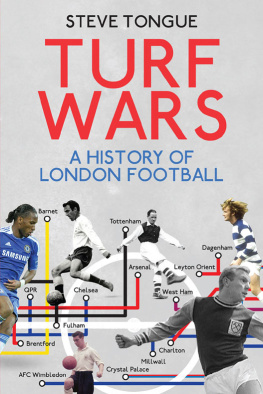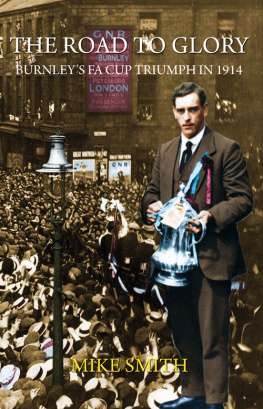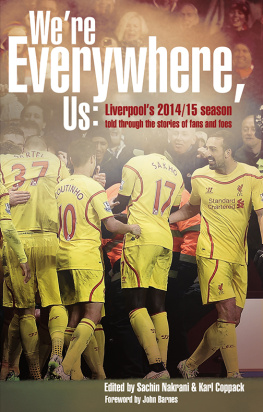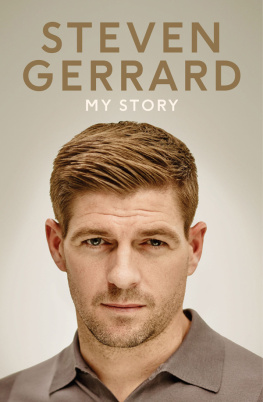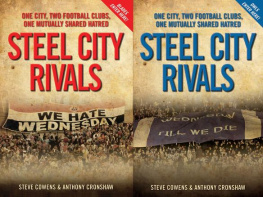Also by Tony Evans
I Dont Know What It Is But I Love It:
Liverpools Unforgettable 198384 Season
TWO TRIBES
Liverpool, Everton and a City on the Brink
Tony Evans
TRANSWORLD PUBLISHERS
6163 Uxbridge Road, London W5 5SA
www.penguin.co.uk
Transworld is part of the Penguin Random House group of companies whose addresses can be found at global.penguinrandomhouse.com
First published in Great Britain in 2018 by Bantam Press
an imprint of Transworld Publishers
Copyright Tony Evans 2018
Cover photographs Getty Images.
Cover design: www.jembutcherdesign.co.uk
Tony Evans has asserted his right under the Copyright, Designs and Patents Act 1988 to be identified as the author of this work.
is taken from You Tell Me by Roger McGough and Michael Rosen published in a revised form by Frances Lincoln Ltd, copyright 2015. Originally published in 1979 by Kestrel Books. Reproduced by permission of Frances Lincoln Ltd, an imprint of The Quarto Group.
This book is a work of fiction and, except in the case of historical fact, any resemblance to actual persons living or dead, is purely coincidental.
Every effort has been made to obtain the necessary permissions with reference to copyright material, both illustrative and quoted. We apologize for any omissions in this respect and will be pleased to make the appropriate acknowledgements in any future edition.
A CIP catalogue record for this book is available from the British Library.
Version 1.0 Epub ISBN 9781473526563
ISBN 9780593075920
This ebook is copyright material and must not be copied, reproduced, transferred, distributed, leased, licensed or publicly performed or used in any way except as specifically permitted in writing by the publishers, as allowed under the terms and conditions under which it was purchased or as strictly permitted by applicable copyright law. Any unauthorized distribution or use of this text may be a direct infringement of the authors and publishers rights and those responsible may be liable in law accordingly.
1 3 5 7 9 10 8 6 4 2
To Alisa and Grace.
Words cant explain what they mean to me.
Acknowledgements
This book started off as a much narrower idea, focused on football. Just writing about sport did not do justice to the events of the time. What happened in the mid 1980s still has ramifications today. Thanks to Giles Elliott for encouraging the wider view and allowing me to junk the original idea and take on a more ambitious project. He also persuaded me to include some of my personal experiences to give a sense of what it was like to be a travelling fan during the era.
Many people were generous with their time. Im grateful for the wit and insight of Peter Reid, Neville Southall, Graeme Sharp, Steve Nicol, Jan Mlby, Mark Lawrenson, Craig Johnston, Kenny Dalglish, John Barnes, Tony Cottee, Frank McAvennie, Mark Bright, Ron Atkinson, James Brown, Peter Hooton and Derek Hatton.
Finally, my thanks to Brenda Kimber, who has seen the project through to completion and helped to sharpen the finished product.
Prologue
The big turn-off
10 May 1986
The seconds were ticking away. As 3 p.m. neared, panic began to set in. The time to take risks was arriving.
Some three hundred people mostly young men were gathered around gate C and a crush was building. They were the wrong side of the wall and hope was fading. Half a dozen of them climbed on to the small roof attached to the tower, not to flee the growing scrum but to attempt to sneak through the bank of three windows thirty feet above the stairs. It was impossible. The openings were blocked and a policeman stood on the other side. A similar set of apertures ten feet higher was unguarded, though. Teenagers hung out of these upper windows, gesturing to those below to come and join them.
There was only one route upwards: a set of high, spiked railings, eight feet away and at a right angle to the windows. The imploring hands of the youths were surely out of reach.
Then a figure wearing a Union flag around his shoulders hauled himself up to the top of the fence, 40 feet above the surging, baying mob. He looked across to where safety lay: the three small windows that were agonizingly out of reach. Three boys leant out of the thin rectangular openings, gesturing for him to jump. He hesitated. The drop was too far to risk.
Then, the youth on the fence reached out. The boy in the nearest window wore a blue ski hat. He edged forward, his centre of gravity dangerously near tipping point, and offered his hand. The boy clinging to the railings placed his outstretched foot against the wall under the window in a desperate attempt to gain some traction. The teenager in the blue hat placed both hands close to the grasping fingers of his friend. They touched and suddenly their hands gripped: they were committed. It was all or nothing.
The youth with the flag swung. It seemed impossible that the desperate grip could hold but the boy with the green sun hat in the middle window darted forward and grabbed a handful of cloth. It was enough. The lad in the third window moved across to help, his red woollen cap disappearing from view. A huge cheer went up from the crowd as the dangling man was dragged to safety.
Below, four others who were attempting the same route as the boy with the Union flag turned back. There had to be another way.
As the minutes ebbed towards 3 p.m., an increasing mood of hysteria swept across a small area of north-west London. Thousands of young men attempted to scale walls, break down gates and overwhelm security. The police force struggled to maintain its tenuous control over the crowds.
These hordes were not attempting to escape captivity. They were not breaking free of bonds imposed by a restrictive political regime. No, they were trying to force their way into a stadium to watch a football match. What made so many people risk life, limb and arrest to watch 22 players kick a ball around?
You had to be there, says Peter Hooton, the lead singer of The Farm. Hooton had a ticket but understands the craving. It was unthinkable to miss it. Liverpool v. Everton in the FA Cup final? It was the biggest game ever.
Less than two hours later, Peter Reid walked across the Wembley turf wearing a blue-and-white cap and a weak, rueful smile. The stadium remained full and chants of Merseyside and Are you watching, Manchester? rained down from both ends of the ground. Reid would rather have been anywhere else. I just wanted to get out of there, he said.
Kenny Dalglish and his team were on a separate lap of honour and milking the acclaim but they were stunned by the show of solidarity on the terraces. Evertonians stayed and applauded, the Liverpool player-manager said. The city came together and stayed together. It was awe-inspiring, especially considering the year wed just had.
This was sport at its best. A tense, see-sawing match, an unlikely comeback and a remarkable show of sportsmanship from both fans and players. Just 12 months earlier, football had sunk to its lowest point. Now the game was showing its sunniest face. Liverpool had won but Everton conducted themselves with absolute grace. At least thats what the watching nation saw.
It was horrible, Reid said. Gruesome. We were all good mates but it was the worst feeling in football.
1
The end of the world as we know it
29 May 1985
Liverpool had lost a football match. The players were numb and bewildered as they sat on the coach taking them away from Heysel Stadium. There was usually silence on the journey home after a defeat but this was a different sort of hush. People had been killed on the terraces before the game.

